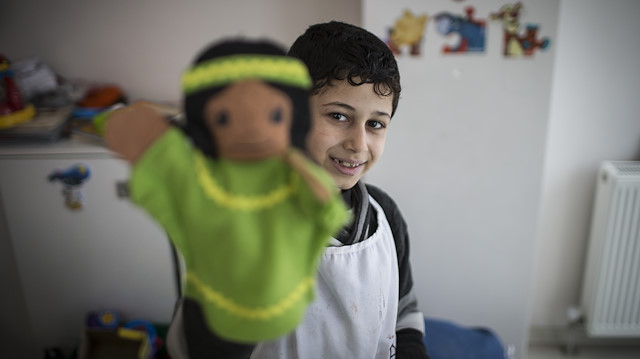
As international community marks World Refugee Day, Anadolu Agency speaks to Syrians in Ankara who built businesses
Syrian refugees in Turkey’s capital have proven resilient in the face of challenges in an unfamiliar environment.
As the international community marks World Refugee Day, Anadolu Agency spoke to some of them about their daily lives and the businesses they opened to provide a brighter future for their families.
Ankara’s Siteler district is home to thousands of Syrian refugees, many of whom have opened shops and businesses.
Hassan Alradi, who has lived in Ankara for more than six years, said integration into the host community is an urgent necessity.
The 32-year-old father of four was forced to leave his home in Hama, Syria, where he was working at the Ministry of Agriculture.
“When we first came to Turkey, we thought [the Bashar] Assad [regime] would fall in a couple of days or weeks. But when we realized that it would take longer and our savings ran out, I started to work,” he said.
“First I distributed bread. Later, I opened a small shop. After that, I bought a car and started helping other Syrian families with their needs, such as paperwork, hospital visits and other administrative work,” he added.
Alradi uses social media to connect with other Syrian families and to coordinate with them in groups.
“Many Syrian families here don’t speak Turkish. They don’t know what is going on and what they have to do. Using the groups on social media, I get in touch with them and update them on any news,” he said.
“I am also in touch with several governmental institutions. If Syrians have any questions or problems, I try to help wherever I can. I am trying to be a mediator as well.”
Speaking about life as a refugee, Alradi said Syrians miss their country and want to return to their homes.
“We have a saying: ‘If someone treats you like themselves, they don’t oppress you.’ Turkey and Turkish people treat us like themselves,” he said, praising Turkey’s efforts towards his community.
- ‘Precious homeland’
Muhammad Rannan opened his own garage in Ankara eight months ago, where he repairs cars.
The 53-year-old father of six was forced to leave his home in Aleppo five years ago.
“I am living in peace here. If I compare myself with those refugees living in Lebanon, Jordan or other Arab countries, I am happy, as I am able to do my own work,” he said.
“I cannot sit and wait for help. I want to work and be able to provide for my family.”
Stressing that Turkish people and government are “the ones who care most for people in need,” Rannan expressed his gratitude.
“Our homeland is very precious. No matter how long we stay here [in Turkey], our hearts will always be there. They will always long to return to our land,” he said.
Turkey currently hosts 3.6 million Syrian refugees and half a million refugees from other countries -- more than any country in the world.
- Preserving family business
When Muhammad Hubbu was forced to leave his hometown four years ago, he took his family and his grandfather’s recipe for ice cream with him.
Hubbu said his family has been making ice cream for many generations, noting he wanted to continue his profession in Turkey, which is why he brought his ice cream machine with him.
When he arrived in Ankara, the 47-year old opened his shop, where he continues to serve ice cream to people in the neighborhood.
“I was forced to leave my home. I had to leave my land. But when I arrived here, Turkey became like my second home. We are well received here,” he said.
Salih -- who did not want give his last name -- said he arrived in Turkey at a young age.
“I was only 18. Still a child,” he said.
“One day we woke up, and everything was destroyed and in ruins. Back in Syria, we had everything. We were financially stable before the war.”
Recounting his first days in a foreign country, he said it was “not easy at all”.
“When I first came, I had no one. I slept on the streets. It was winter, and street dogs would sleep next to me,” he said.
The 24-year old from Aleppo said he worked as a garbageman to save money to open his butcher shop in Ankara three years ago, which was also his family business back in Syria.
Salih said his shop is open seven days a week, adding it helps him pass the time as he has a “monotone routine”.
“I miss my home, my streets, my friends, my work -- everything,” he said.
“The most painful memory for me is the loss of my loved one. She was killed in an airstrike in Aleppo.”
Salih said he also lost many family members, friends and neighbors.
Syria has only just begun to emerge from a devastating conflict that began in early 2011 when the al-Assad regime cracked down on demonstrators with unexpected ferocity.
According to UN figures, hundreds of thousands of civilians have been killed or displaced in the conflict, mainly by regime airstrikes in opposition-held areas.


